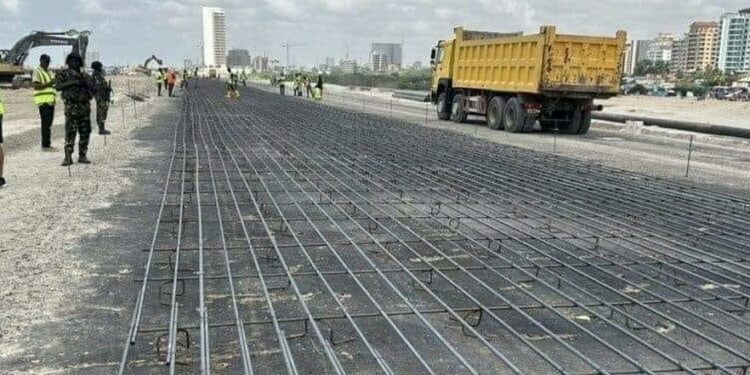Phase 1 segment 1 of the Lagos-Calabar coastal highway would be financed by a $747 million syndicated loan obtained by Nigeria.
The financing covers the 47.47-kilometer distance from Victoria Island to Eleko Village in Lagos, according to a statement released on Wednesday by Mohammed Manga, the ministry of finance’s director of communications and public relations.
Manga said the funding is the first syndicated road infrastructure loan of its size in Nigeria and is a clear indication that international investors are confident in the nation’s building pipeline and reform trajectory.
In addition to participating in the syndicate with other regional and foreign lenders, he said Deutsche Bank served as the global coordinator, the first mandated lead arranger, and the bookrunner.
Partially commercial and political risk insurance was offered by the Islamic Corporation for the Insurance of Investment and Export Credit (ICIEC), the director added.
He stated that the syndicate has the backing of international commercial banks, export credit agencies, and development finance institutions. Of particular note is First Abu Dhabi Bank, which serves as an agent for all facilities and an intercreditor agent, demonstrating its unwavering and expanding support for Nigeria.
Other lenders included Zenith Bank (via its offices in the UK, Paris, and Nigeria), the ECOWAS Bank for Investment and Development (EBID), the African Export-Import Bank, the Abu Dhabi Exports Office (ADEX), and Nexent Bank N.V. (previously Credit Europe Bank N.V.).
The project was given to Hitech Construction Company, one of Nigeria’s top infrastructure companies, under the terms of an EPC+F (Engineering, Procurement, Construction + Financing) contract.
According to Manga, the framework aspires to establish a strategic collaboration between the private sector and the government, facilitating the smooth alignment of funding solutions with technical execution.
It facilitates expedited project completion while maximizing private sector participation in the nation’s priority infrastructure, the statement claims.
According to him, more than 70% of the highway’s phase 1 section 1 construction is already finished.
Long-term resilience and efficiency are demonstrated by the highway’s Continuously Reinforced Concrete Pavement (CRCP) construction. It provides exceptional durability and cost-effectiveness, with low maintenance required for a minimum of 50 years, according to the statement.
“In order to ensure alignment with the highest international standards, the project’s design and implementation have been molded by thorough technical, legal, environmental, and social assessments.
The Lagos-Calabar Coastal Highway will be an essential commercial and logistical route that will boost tourism, regional integration, lower transportation costs, and generate employment. The project’s operational and financial sustainability is being ensured by the finalization of a tolling scheme.
“A self-sustaining, concession-backed framework will be supported by these mechanisms, assisting in ensuring long-term viability.” Regional and foreign investors are very interested in the financing that is currently being arranged for the next phases.
According to Manga, the historic deal shows how brave macroeconomic changes and a dedication to delivering bankable, transformative projects have rekindled foreign financial institutions’ interest in Nigeria.
“TRANSACTION SIGNALS TO INVESTORS AS THE NIGERIAN MARKET GROWS”Nigeria’s macroeconomic reforms have been successful, and foreign capital has returned to help the country’s development, according to Wale Edun, minister of finance and coordinating minister of the economy, who spoke about the deal.
Read Also: Presidency Not About Region, But Ending Tinubu’s Reign — ADC’s Okonkwo
He stated that the government is committed to financing infrastructure via methods that are transparent, transformative, and sustainable, and that the deal is an example of the vision in action.
“The closing of this market-defining financing is another indication of Mr. President’s determination to expedite the private sector’s involvement in infrastructure development and financing,” Edun stated.
The country is positioned to undergo a complete shift to Public Private Partnerships for the design, development, funding, operations, and administration of vital public infrastructure.
The government’s dedication to upholding the integrity of contracts and using creative financing methods to finance vital national projects that will promote inclusive and long-term growth is communicated to investors and private sector players.
The deal, according to Works Minister David Umahi, is a show of confidence in Nigeria’s plan for economic change.
He stated that this funding establishes a solid foundation for future public-private infrastructure collaborations and that the Lagos-Calabar Highway is a vital national asset.
Hitech Construction Company Limited’s managing director, Dany Abboud, said he was proud to have completed the coastal highway project.
“We are demonstrating that Nigerian engineering, supported by organized international finance, can meet global standards with over 70% of Phase 1 Section 1 completed,” Abboud stated.
“Unmatched durability and cost-efficiency are guaranteed when CRCP technology is utilized.”
Chief executive officer of the ICIEC Khalid Khalafalla also spoke, expressing delight in working with the Nigerian government and other financiers to complete the Lagos–Calabar coastal highway project.
“With ICIEC’s sovereign risk coverage solution, we are opening up critical infrastructure that will reduce traffic, promote regional trade, and propel inclusive economic growth,” he stated.
The initiative would create jobs, boost local skills, and assist small and medium-sized enterprises, Khalafalla said, highlighting ICIEC’s strong commitment to sustainable development, enhanced regional connection, and shared prosperity among West African communities.

